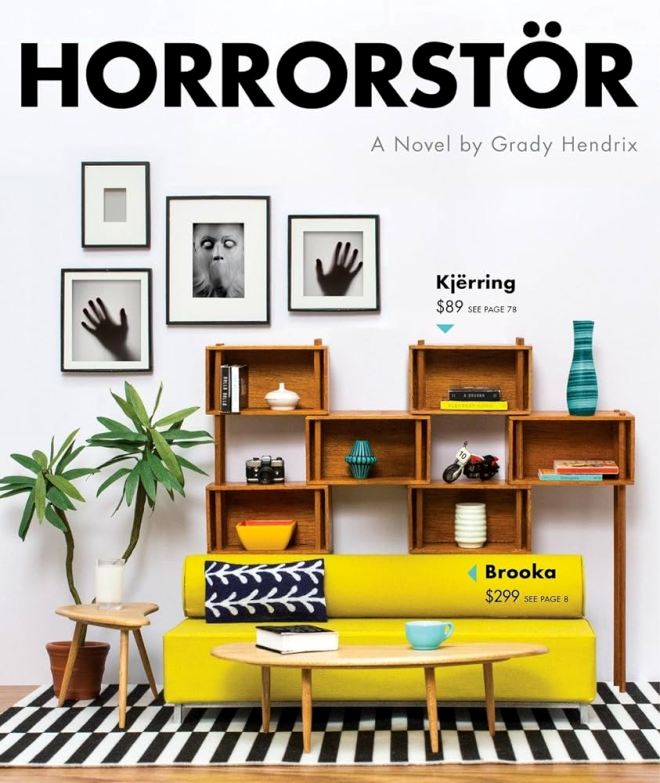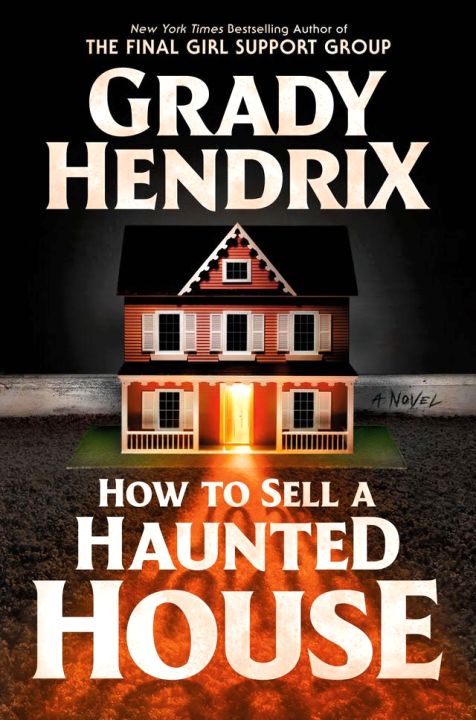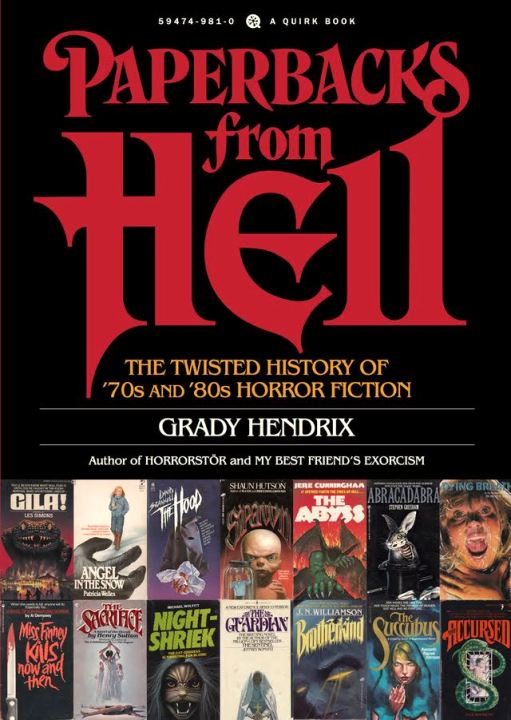
On this month's Special Page:
Our Media Director, Trish Wilson, captured an exclusive interview with the New York Times best-selling author Grady Hendrix
IN THE "SPECIAL PAGE" ARCHIVES:
Joe R. Lansdale
Billy Martin (aka Poppy Z. Brite)
Daniel Knauf
Tane McClure
Nicholas Tana
Elizabeth Massie

Grady Hendrix is an award-winning novelist and screenwriter. He is the author of Horrorstör, My Best Friend’s Exorcism, The Southern Book Club’s Guide to Slaying Vampires, The Final Girl Support Group, How to Sell a Haunted House, and more. He also authored the Bram Stoker Award–winning nonfiction book titled Paperbacks from Hell, which is about the horror paperback craze from the 1970s and 1980s. His new book Witchcraft for Wayward Girls comes out in January 2025.
You can read an article about him in the New Yorker Magazine HERE
Grady Hendrix Interview
By Trish Wilson
Trish Wilson: First off, congratulations on making the 2023 Bram Stoker Awards Final Ballot for your novel, "How to Sell a Haunted House". It must be exciting and an honor to be nominated. Plus, I read that the book is in development at Legendary to be made into a movie.
Grady Hendrix: Awards are fun, but they don’t get you a discount on coffee, so their usefulness is limited. I want to try to get as many as I can, however, because I want to be that guy in a disaster movie who insists on running back onto the sinking ship to grab all his awards before it goes under and then their weight pulls him to the bottom of the sea.
Trish Wilson: You have a lot of interesting things coming down the pike. Your novel "My Best Friend's Exorcism" was made into a movie and it streamed on Amazon in 2022. I saw it, and it was very enjoyable. It was also quite successful. You are going to be very busy. "Ankle Biter", one of your short stories, is in development with Sony. Your book "The Southern Book Club's Guide to Slaying Vampires" is in development at HBO. "Final Girl Support Group" is in development at Max with Andy Muschietti directing and produced by Charlize Theron. On top of that, the aforementioned "How To Sell A Haunted House" is in development at Legendary. James Ashcroft is directing. Ghost House and Aperture are set to produce. But wait, there's more! "Horrorstör" is getting set up at New Republic. Do you sleep? LOL, but all kidding aside, how did all of this come to fruition and how much say do you have in the process of turning your works into movies and/or TV series? Has Hollywood changed anything in your books?
Grady Hendrix: The books are the books and I don’t try to "Hollywood" them. In fact, I often deliberately try to make my books impossible to adapt. I went out of my way to make sure the climax of "Horrorstör" involved a flood and large numbers of rats because nothing is a bigger pain in the ass to put in a movie than water and animals, but they’re adapting it anyways, so what do I know? In terms of how involved I am, it varies. On one end of the spectrum, I had nothing to do with "My Best Friend’s Exorcism", on the other end of the spectrum I’m a writer on "Southern Book Club."
Trish Wilson: Why is the haunted house novel so popular? What made you want to tackle this old trope and turn it on its head?
Grady Hendrix: If I knew what makes anything popular, I would be keeping that secret to myself and using it to get rich! But I wrote "How To Sell a Haunted House" because I started it during the pandemic when I missed my family, so I wanted to write a book about a family. Haunted house books are always about families (family curses, family secrets, ancestral homes) so they just went together. It’s funny you say I turned it on its head, because I actually think it’s a very traditional haunted house book, minus the murder puppets. But there are murder puppets in some traditional haunted house books, too. I think this answer shows that I clearly have no idea what I’m doing and most of it happens by chance.
Trish Wilson: What scares you?
Grady Hendrix: Animals half my size or larger. Unless they’re in a group of six or more.
Trish Wilson: Did you have mentors early in your career who helped you? If you did, who were they? What kind of help did they give you? I've noticed some writers have had mentors and they've maintained professional relationships and even friendships with them.
Grady Hendrix: My life changed when I went to the Clarion Science Fiction and Fantasy Writer’s Workshop in San Diego. I was there with about 24 other people for six weeks and each week a writer would come and lead the workshop. Every single person there made me a better writer, and every single teacher was enormously generous with their time. I owe them everything.
Trish Wilson: Did you start out in comedy and then horror, or the other way around?
Grady Hendrix: I don’t see a difference. Horror books tend to go a little more grimdark, but I can’t think of many horror movies that don’t have jokes in them. Humor is a part of life, and the same way I wouldn’t want to spend time with a person who doesn’t have a sense of humor, I wouldn’t want to write a book I didn’t want to spend time with, either.
Trish Wilson: What is it about horror that appeals to you, and how did you get into the comic aspects of the genre?
Grady Hendrix: I’m not good at imagining other planets or secondary worlds, so horror allows me to write about normal people, here and now, only they're not shopping for groceries and talking about their failing marriages, but fighting vampires and exorcizing demons. I figure my job is to make the horror I write as realistic as possible, so I apply the reality principle to everything from haunted houses to slasher movies and stop just short of it becoming totally ridiculous.
Trish Wilson: You put on one hell of an entertaining live show. I saw your "Paperbacks from Hell" live performance at Stokercon with your "carnival barker delivery" as described by Bloody Disgusting. How do you prepare for these performances? What made you decide to go live like this at conventions?
Grady Hendrix: Actually, I do a big show for all my author events because it’s more fun that way, both for me and for the audience. (I am making a big assumption here.) Doing the research and writing the show is my reward for finishing a book. I just don’t understand why a book event can’t be as much fun as seeing a band.
Trish Wilson: How did you do research for "Paperbacks From Hell"? How'd you decide which books to feature?
Grady Hendrix: I had to fit "Paperbacks From Hell" into a 10 month gap in my schedule so I read 260+ books and wrote it during that period. It was less a case of "What books do I include?" and more a case of "When do I run out of time?" There were some books that had to be in there because they had historical importance like "Jaws" and "Burnt Offerings" and I didn’t include authors like Peter Straub, Stephen King, and Clive Barker because they’re more widely known. Otherwise, it all came down to what I could get my hands on and how fast could I read it.
Trish Wilson: Which are some of the more memorable books you discovered while researching "Paperbacks From Hell"? I mean the truly bizarre and outrageous ones.
Grady Hendrix: Well, "The Little People" is right there at the front of the book and it’s the book that inspired me to write "Paperbacks From Hell"in the first place. Once you get to "Nazi leprechauns" I don’t think terms like "bizarre and outrageous" have much meaning anymore.
Trish Wilson: These days the term "horror" makes some readers squeamish. They prefer other terms like "dark fiction" or "thriller". It seems the term "horror" makes a comeback some decades and then goes into hiding again. Have you noticed anything like that?
Grady Hendrix: Horror is definitely having a moment, and publishers are clearly seeing value in promoting it again as its own thing, rather than hiding it in another genre. But, to be honest, this is all marketing department stuff and not anything I think about too much.
Trish Wilson: You've said that covers are an important way for books to get noticed, especially when it came to the '80s horror heydays. What makes a good cover, and what makes one that sucks?
Grady Hendrix: If I was a graphic designer I would have some definite rules of thumb, but honestly I feel like you want to stand out from the pack and give a reader a sense of what’s between the covers. After that, it all comes down to personal taste, and praying you have some. Adding Nazi leprechauns helps, however.
Trish Wilson: What are some of your favorite horror subgenres? And which ones have disappeared? Are there obscure subgenres that you would like to see making a comeback?
Grady Hendrix: There need to be more animal attacks books. I love books where animals have just had ENOUGH and are ready to start chowing down on humans after we’ve worked their last nerve. To be honest, a book where every dog under 5 pounds went on a rampage would be a book I’d buy. I imagine they’d pretty much murder every pet owner in Manhattan.
Trish Wilson: Please leave your web site, Patreon (if any), social media links, etc. Also, what are your plans for the future? What other future project may readers look forward to?
Grady Hendrix:"Witchcraft for Wayward Girls" is my witch book set in a home for unwed mothers in Florida in 1970 and it's out in January. Otherwise, you can find me at www.gradyhendrix.com


